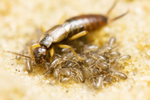
DAVIDSON Gabrielle
Recommendations: 0
Review: 1
Review: 1

Alteration of gut microbiota with a broad-spectrum antibiotic does not impair maternal care in the European earwig
Assessing the role of host-symbiont interactions in maternal care behaviour
Recommended by Trine Bilde based on reviews by Nadia Aubin-Horth, Gabrielle Davidson and 1 anonymous reviewerThe role of microbial symbionts in governing social traits of their hosts is an exciting and developing research area. Just like symbionts influence host reproductive behaviour and can cause mating incompatibilities to promote symbiont transmission through host populations (Engelstadter and Hurst 2009; Correa and Ballard 2016; Johnson and Foster 2018) (see also discussion on conflict resolution in Johnsen and Foster 2018), microbial symbionts could enhance transmission by promoting the social behaviour of their hosts (Ezenwa et al. 2012; Lewin-Epstein et al. 2017; Gurevich et al. 2020). Here I apply the term ‘symbiosis’ in the broad sense, following De Bary 1879 as “the living together of two differently named organisms“ independent of effects on the organisms involved (De Bary 1879), i.e. the biological interaction between the host and its symbionts may include mutualism, parasitism and commensalism.
So far, we have relative few studies that explore the role of symbionts in promoting social behaviours such as parental care. Clearly, disentangling cause and effect when assessing the functional significance of symbiotic relationships in general is extremely challenging, and perhaps even more caution is needed when assessing the role of symbionts in the evolution of parental care, given the high fitness benefits to the offspring of receiving care. An interesting study on the symbiotic relationship between termites and their eukaryotic gut symbionts proposes a role of gut flagellates in the origin of subsocial behaviour (extended offspring care) in the termites through proctodeal trophallaxis (i.e. anus-to-mouth feeding), driven by mutualistic beneficial interactions (Nalepa 2020). Van Meyel et al. (2021) hypothesized a role of gut symbionts in promoting maternal care behaviour in the European earwig, and set out to test this idea in a carefully executed experimental study. They used a broad-spectrum antibiotic treatment to alter gut microbiota in mothers and examined its effect on maternal care provisioning. While the antibiotic treatment altered the gut microbiome, no effect on pre- or post-hatching maternal care was detected. The authors also investigated a broad range of physiological and reproductive traits measured over a major part of a female’s lifetime, and detected no effect of microbiome alteration on these traits. The study therefore does not provide evidence for a direct role of the gut microbiome in shaping offspring care in this population of European earwigs.
Within populations, earwigs show inter-individual variation in the expression of maternal care (Meunier et al. 2012; Ratz et al. 2016), and there is evidence that genetic and environmental factors contribute to this this variation (Meunier and Kolliker 2012; Kramer et al. 2017). The study by Van Meyel et al. (2021) is the first to analyse microbiome composition of the European earwig, and they study host-symbiont associations in a single population. A next step could be to explore among population variation in the gut microbiome, to achieve a better understanding on host-microbiome variation and dynamics in wild populations. Depending on the nature of host-symbiont associations across populations, new perspectives on their functional significance may arise (Hird 2017; Johnson and Foster 2018). It is therefore too early to conclusively confirm or reject the role of microbial symbionts in the expression of parental care in this system.
References
Correa, C. C., and Ballard, J. W. O. (2016). Wolbachia associations with insects: winning or losing against a master manipulator. Frontiers in Ecology and Evolution, 3, 153. doi: https://doi.org/10.3389/fevo.2015.00153
De Bary, A. (1879). Die Erscheinung der Symbiose. Verlag von Karl J. Trubner, Strassburg.
Engelstädter, J., and Hurst, G. D. (2009). The ecology and evolution of microbes that manipulate host reproduction. Annual Review of Ecology, Evolution, and Systematics, 40, 127-149. doi: https://doi.org/10.1146/annurev.ecolsys.110308.120206
Ezenwa, V. O., Gerardo, N. M., Inouye, D. W., Medina, M., and Xavier, J. B. (2012). Animal behavior and the microbiome. Science, 338(6104), 198-199. doi: https://doi.org/10.1126/science.1227412
Gurevich, Y., Lewin-Epstein, O., and Hadany, L. (2020). The evolution of paternal care: a role for microbes?. Philosophical Transactions of the Royal Society B, 375(1808), 20190599. doi: https://doi.org/10.1098/rstb.2019.0599
Hird, S. M. (2017). Evolutionary biology needs wild microbiomes. Frontiers in microbiology, 8, 725. doi: https://doi.org/10.3389/fmicb.2017.00725
Johnson, K. V. A., and Foster, K. R. (2018). Why does the microbiome affect behaviour?. Nature reviews microbiology, 16(10), 647-655. doi: https://doi.org/10.1038/s41579-018-0014-3
Kramer et al. (2017). When earwig mothers do not care to share: parent–offspring competition and the evolution of family life. Functional Ecology, 31(11), 2098-2107. doi: https://doi.org/10.1111/1365-2435.12915
Lewin-Epstein, O., Aharonov, R., and Hadany, L. (2017). Microbes can help explain the evolution of host altruism. Nature communications, 8(1), 1-7. doi: https://doi.org/10.1038/ncomms14040
Meunier, J., and Kölliker, M. (2012). Parental antagonism and parent–offspring co-adaptation interact to shape family life. Proceedings of the Royal Society B: Biological Sciences, 279(1744), 3981-3988. doi: https://doi.org/10.1098/rspb.2012.1416
Meunier, J., Wong, J. W., Gómez, Y., Kuttler, S., Röllin, L., Stucki, D., and Kölliker, M. (2012). One clutch or two clutches? Fitness correlates of coexisting alternative female life-histories in the European earwig. Evolutionary Ecology, 26(3), 669-682. doi: https://doi.org/10.1007/s10682-011-9510-x
Nalepa, C. A. (2020). Origin of mutualism between termites and flagellated gut protists: transition from horizontal to vertical transmission. Frontiers in Ecology and Evolution, 8, 14. doi: https://doi.org/10.3389/fevo.2020.00014
Ratz, T., Kramer, J., Veuille, M., and Meunier, J. (2016). The population determines whether and how life-history traits vary between reproductive events in an insect with maternal care. Oecologia, 182(2), 443-452. doi: https://doi.org/10.1007/s00442-016-3685-3
Van Meyel, S., Devers, S., Dupont, S., Dedeine, F. and Meunier, J. (2021) Alteration of gut microbiota with a broad-spectrum antibiotic does not impair maternal care in the European earwig. bioRxiv, 2020.10.08.331363. ver. 5 peer-reviewed and recommended by PCI Evol Biol. https://doi.org/10.1101/2020.10.08.331363